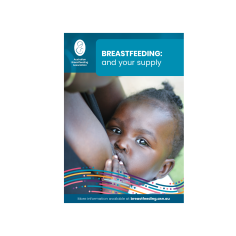Want to boost your milk supply? Simple steps can make a big difference.

In the early weeks, you and your baby work together to build your milk supply. Breastfeeding whenever your baby shows feeding cues helps them get all the milk they need to grow and develop.
Your body learns how much milk your baby needs over time. Sometimes your supply might drop. This can happen if your baby has formula, breastfeeds less often or if you or your baby are very unwell.
It’s common to worry about milk supply but sometimes changes in your breasts or your baby are normal. If you’re unsure, read more about this. Is it really low supply?
The good news is, breastfeeding works on supply and demand. The more milk that’s removed from your breasts, the more milk you'll make. Here are some ways to do this.
Breastfeed your baby more often
You may notice a difference in just a few days by trying these ideas:
Offer more breastfeeds. This is the simplest and most effective way to increase your supply. Most young babies will have 8 to 14 feeds in 24 hours and some will have more than this.
Feed your baby based on their needs rather than set times. Some feeds may be closer together, so look for early signs of hunger.
Feeds don’t need to be long. Some may be 5 to 10 minutes, others 30 minutes or more, like when your baby slowly feeds to sleep.
Try some top-up breastfeeds or quick feeds between your baby's usual breastfeeds.
Breastfeed to soothe your baby instead of using other comforts like a dummy. Many babies have fussy periods when they want to feed more. This usually settles down in a few days so just follow your baby's cues.
If your baby sleeps longer at night and misses a feed, it’s okay to wake them. Your milk-making hormones are highest at night so this can help boost your supply.
Feed from both breasts
In the early days, your baby may be content with only one breast. Soon, most babies need more so offer the other.
Let your baby finish the first breast before switching. They may be ready to swap sides when their sucking slows or they fall asleep or come off the breast by themselves.
You can even change sides a few times during a feed, whenever your baby's sucking slows. This triggers your let-down reflex again and encourages stronger sucking.
Help your baby get the milk
- Check your baby's latch. A baby who is well attached can remove milk more easily. Make sure it feels comfortable and you can see or hear regular sucking and swallowing.
- Help your milk flow. Relaxing, deep breathing and warmth on the breast can help.
- Try breast compressions to help your baby get more milk.
Reduce top-ups
Formula or other foods can make your baby less hungry for your breastmilk. To boost your supply, offer more breastfeeds instead.
Offer both breasts at each feed. After a short break offer the first (and even the second) breast again. You may find your baby gets enough breastmilk this way and doesn't need any expressed breastmilk or formula.
Should I express?
Expressing can take a lot of time and energy. If your baby can breastfeed well they'll usually boost your supply more easily than pumping.
But if the ideas above aren’t enough for you or your baby can’t feed well or often enough, you may need to express.
- Try short pumping sessions close together. Pump for 5 to 10 mins, repeating this several times over an hour or two.
- Finish off each session with a few minutes of hand expressing to remove more milk.
- Express both breasts at the same time or express one breast while you breastfeed from the other. This saves time and can remove more milk.
- As your supply increases you'll be able to stop expressing and just breastfeed.
Next steps
Most mums find the tips above are enough to increase their supply to meet their baby's needs. If you don’t notice a difference after a few days, or your baby isn't thriving, you may need extra support.
Struggling with a low milk supply can feel very upsetting and frustrating, but you don't have to face it alone. Call the National breastfeeding helpline to chat with a breastfeeding counsellor if you're worried. And remember that any amount of breastmilk you provide your baby is valuable.
Some medical conditions can make it harder for a baby to suck well, or for a mum to make enough milk. Talk to your child health nurse, lactation consultant or doctor if you're concerned.
This video from Global Health Media gives steps to improve your milk supply and your baby’s feeding.
© Australian Breastfeeding Association October 2025
Find out more about building your milk supply
Online interactive session free for members
Newborn Virtual Village - working out your supply

Evidence-led info and practical tips from our Breastfeeding Information Series
Breastfeeding: and your supply








